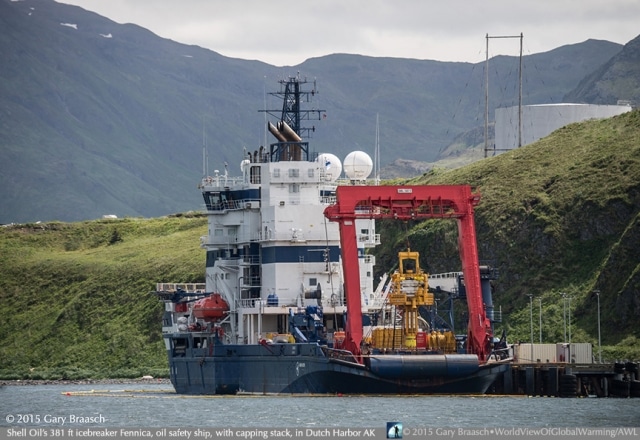Shell officials are still hoping to launch exploratory drilling this month at the company’s Burger prospect, 70 miles off the coast of Alaska in the Chukchi Sea, even though a key ship in its fleet was forced back to port before it had even left the harbor last week after a 3-foot-long gash was discovered in its hull.
The company has to send the MSV Fennica to Portland because Terminal 5 at the port of Seattle, where Shell’s two drilling rigs were stored before they departed for Alaska, is a cargo terminal that doesn’t allow heavy repairs.
It is expected to take several weeks to repair the Fennica, according to FuelFix. The trip to Portland alone will take more than a week, and the Fennica appears to still be in Unalaska in the Aleutian Islands right now. But Shell has already begun moving its fleet into place in the Chukchi Sea, and does not plan on waiting for the Fennica to return before commencing drilling activities.
The Fennica is one of only two icebreakers in Shell’s 30-ship fleet that are essential for keeping ice away from the drilling rigs.
It’s unclear whether or not the US Department of the Interior will give the company the go-ahead to begin drilling, however, given that the Fennica was also carrying critical equipment needed to cap the well in the event of a blowout or other emergency.
“We do not anticipate any impact on our season, as we don’t expect to require the vessel until August,” Shell spokesman Curtis Smith said, per FuelFix. Requests for comment from the DOI were not returned.
The Coast Guard is reportedly still investigating what caused the 39-inch breach in the Fennica’s hull, but surveys of Dutch Harbor since the ship’s accident have revealed shallower-than-charted areas along the route the ship was taking.
Shell appears to have opted for speed over safety in sending the Fennica along the route it did. Some of the charted depths in the Fennica’s path gave it just seven and a half feet of clearance in some areas — even at high tide, as it was when the ship was under way on July 3 and the hull breach was discovered. Shell could have sent the Fennica on a slightly longer route out of Dutch Harbor that would have kept it in deeper water.
This latest mishap is not doing much to convince the world that Shell is “Arctic Ready.”
“The damage to the Fennica due to traveling through shallow water is yet another example of Shell’s reckless attitude in its pursuit of unburnable Arctic oil,” David Turnbull of Oil Change International told DeSmog, referring to the fact that the vast majority of proven fossil fuel energy reserves cannot be burned if we’re to keep global warming below 2 degrees Celsius, the critical threshold climate scientists say is necessary to prevent the worst impacts of runaway climate change.
“Shell seems ready to stop at nothing to get to this oil, including apparently leaving its own ships — and common sense — behind,” Turnbull added.
There are legitimate questions as to how the company can safely operate in treacherous Chukchi waters without the Fennica’s emergency well-capping equipment and other spill response gear, as well as the Fennica’s ice-breaking capabilities.
Shell’s own emergency response plans call for the Fennica to be used even in emergency scenarios where the well cap isn’t necessary. The company is waiting on two permits from the DOI before it can actually begin drilling, so there’s still a chance for regulators to decide the absence of the ship puts workers and the environment at too much risk.
After this season, Shell will have spent $7 billion in the pursuit of oil in the Arctic, Reuters reported. Its first expedition to the region, in 2012, was eventually aborted by the company after several embarrassing setbacks and accidents, including the unintentional grounding of one of its drilling rigs.
Image Credit: Shell Oil’s 381 ft icebreaker Fennica, oil safety ship, with capping stack, in Dutch Harbor, AK © 2015 Gary Braasch
Subscribe to our newsletter
Stay up to date with DeSmog news and alerts






